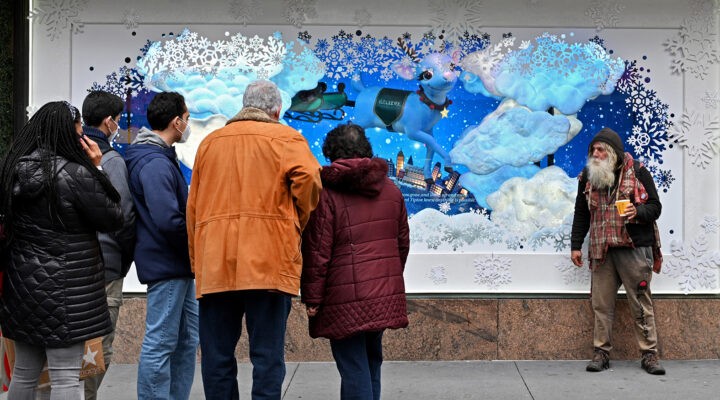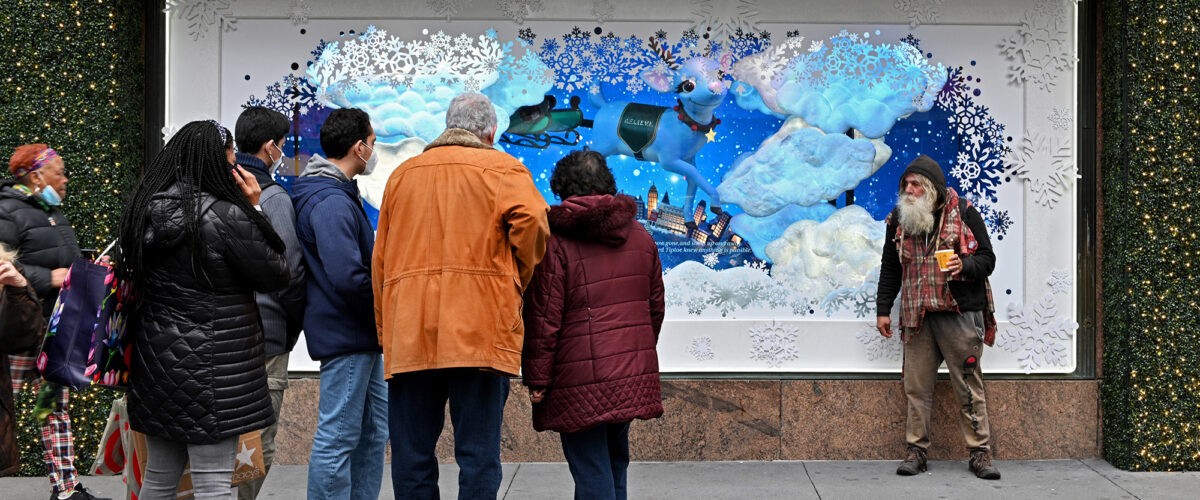Christmas is, for many or most Christians, the most joyous Christian celebration. And it certainly should be a great reason of joy; in fact, according to the Christian tradition, we are celebrating the birth of God’s Son on earth, for the sake of derailed and fallen humanity.
But joy, at Christmas, is only a part of the story. Joy is premised on the actualizations of the promises that the birth of Jesus has initiated: salvation of the fallen world, the unity of his renewed kingdom or church and the restoration of the lost paradise.
Since these are works in progress, not something we can fully enjoy, our joy is strangled and incomplete. It is a joy that suffers and hopes, that longs to see God’s kingdom in a society modeled on the love of the Father and the suffering and life of the Son. If it does not, we are living an illusion and our joy is a vain one that misses the essence of Christianity.

Gavril Andreicut
In Christianity, joy comes through suffering, which is an image of Jesus’ life and of the darkness of the Cross. People who are happy and full of joy at this Christmas without realizing the suffering of people for whom God sent his only Son on earth are failing to understand the God of the Christians and the essential meaning of Christianity.
Joy has meaning only when we are mindful of the ongoing work of the church: salvation, restoration and unity.
Salvation and love of neighbor
Salvation certainly is, along with faith, the main message of the Bible. It means change, a change that is obvious in speech and action. Action is best expressed in the two most important teachings of the Bible: the love of God and the love of neighbor.
When you love someone, your entire life revolves around that person. For real Christians, this simply means being very considerate of God and neighbors. In essence, it is what Jesus did throughout his life, in his birth, life and death — he submitted himself to the will of the Father and identified himself with the wretched human beings.
But that is something we cannot say about Christians in the United States. We live without thinking what God thinks of our decisions and actions or what the neighbor does. And this is a problem because God loves our neighbors as God loves us, and by failing to give proper attention to the neighbor, we in fact show how much we disregard and neglect God.
Before we are sure that our joy is related to Jesus and Christmas, we should ask ourselves whether we really care about Jesus and the neighbor.
Salvation should lead to unity
The unity of God’s renewed kingdom should be a natural consequence of the process of salvation. Those saved and who are the body of Christ should be united. And while diversity may be important — as it is claimed today due to the reality of divided Christianity — it should be a diversity that functions perfectly well together and submits to a central authority that makes it to function well together.
The image of the body of Christ is an ideal image of what Christianity should be. The organs of the body work harmoniously, guided by the mind, and do not work against each other. When an organ happens to work in opposition to the other parts of the body, it is ill, declining, and with the possibility of dying.
“Christians cannot agree on what Christ teaches, not because Christ’s teaching is not clear enough regarding faith and salvation but because we fail to love God and our fellow Christians.”
Not only is Christianity divided in many groups and denominations, but even these many denominations are divided and fragmenting themselves into myriads of small groups. These fragmentations are not happening because the fragmented churches are getting along together well but because they cannot agree with each other on certain issues.
Christians cannot agree on what Christ teaches, not because Christ’s teaching is not clear enough regarding faith and salvation but because we fail to love God and our fellow Christians. Willingly or unwillingly, we process and receive information from the mind of the body, from Jesus and the Scriptures, in ways that satisfy our own human needs and traditions.
As Augustine would have said, people divide the body of Christ, but only one can be the true body of Christ; the others may be just imitations. It is likely that the body of Christ is not identical with a denomination. Instead, it consists of people from many denominations, of people who do their best to love God and neighbor.
Christmas means renewal
Mindful Christians are aware that the main meaning of Christmas is renewal, a renewal that is indissolubly related to suffering, until the body of Christ is finally restored and renewed at the end of history.
In this sense, the meaning of history is beyond history and time, when peace finally will be granted. But until then, the meaning of Christmas — and of the Christian life, for that matter, with its celebrations and joy — is interwoven with the suffering and loneliness that trouble humanity.
“The meaning of Christmas … is interwoven with the suffering and loneliness that trouble humanity.”
At this Christmas, only “physical” Christians, those who only think of themselves, can be happy without any reservation. They are those who are hearing only what pleases them, while they fail to hear the parts of the body of Christ that groan in despair due to the pain inflicted on the body by those who are neglecting the head, namely God, and the neighbor.
Those who are Christ’s do hear the tears of those who are part of the body of Christ. They also hear the tears of all human beings, for we all are God’s creation. The truth is that God loves others no less than God loves you and me; indeed, God loves all similarly. Consequently, to love neighbor is a kingly law, as James tells us. The failure to understand it would mean to misunderstand not only Christmas but also God and Christianity.
Christmas means renewal, that is, salvation and the restoration and unity of God’s eternal kingdom. It certainly entails joy because the process of restoration has begun. But as this is a work in progress, at Christmas, Christians cannot lightly forget that our mission is to be mindful of the tears that are shed in the body of Christ and the world.
Gavril Andreicut teaches theology at Saint Xavier University in Chicago. He also is a visiting professor at the Baptist Theological Seminary in Bucharest, Romania.
Related articles:
Merry Christmas from Paul the apostle in prison | Opinion by Jenna Sullivan
Joseph, did you know? A reflection on fatherhood during Advent | Opinion by Darrell Hamilton II
Seeking the Prince of Peace in a nation overwhelmed by threats | Opinion by Bill Leonard


